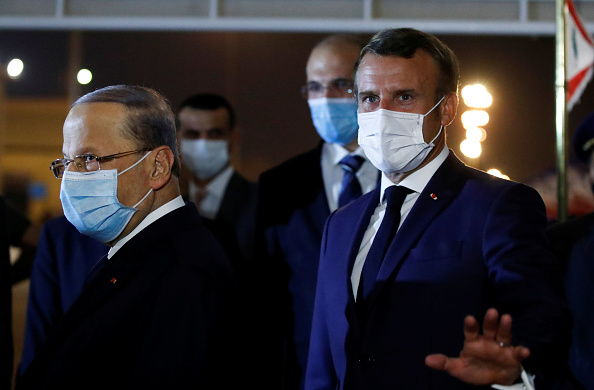This is not a surprising development and the French extended the deadline two more days to give Adib more time and to also give Macron more time to exert pressure on political parties. However, it is surprising that the French official would discuss government formation directly with Hezbollah officials. Even if the French were not in the mood of giving guarantees, this meeting has a very high symbolic value to Hezbollah, and its allies.
According to reports, Lebanon’s General Security chief Abbas Ibrahim is mediating this discussion, upon a request by Aoun, focusing on the main issue at stake: Hezbollah/Amal insistence on keeping the ministry of Finance, and having the green light to name the minister of their choosing. This, of course, contradicts both the constitution and the roadmap set by the French President Emmanuel Macron for Lebanon.
CURRENT DILEMMA
Although it seems the issue is this ministry per se, the dilemma is much deeper, and it relates to threat of US sanctions on Hezbollah’s allies, mainly after the first batch of sanctions were issued last week against two of them. Therefore, Hezbollah is trying to play on the differences between Paris and Washington, hoping that they can reach a compromise that would please the French without infuriating the Americans.
That would means that Paris and Washington coordinate and have some kind of a joint operation room where deals are discussed and plans are made. However, truth be told, there is no coordination between the two capitals. In fact, Washington is not satisfied with the French initiative for Lebanon and believes that it hampers the US efforts and the Trump administration’s maximum pressure campaign against Iran and Hezbollah. Therefore, the recent US Treasury sanctions did not take place after coordination with the French. On the contrary, these were in response to Paris’ efforts in Lebanon.
Hezbollah and its allies prefer the French efforts but they still cannot allow Macron to strip them of everything. They feel that the French idealism and ambitious roadmap is not a real ultimatum. They believe that Macron is not going to impose sanctions on Hezbollah or its allies, even if they refuse the whole initiative. Therefore, they realized that the best way is to play Macron’s ambitions and deploy efforts to buy time.
Even if Macron was going to play this game, it has become impossible to do so after US Secretary of State Mike Pompeo’s comments earlier this week. On Tuesday, Pompeo warned France that its efforts to resolve the crisis in Lebanon would be in vain without immediately tackling the issue of Iran-backed Hezbollah’s weaponry. “The United States has assumed its responsibility and we will stop Iran buying Chinese tanks and Russian air defense systems and then selling weapons to Hezbollah (and) torpedoing President Macron’s efforts in Lebanon,” Pompeo told France Inter radio. “You can’t allow Iran to have more money, power and arms and at same time try to disconnect Hezbollah from the disasters it provoked in Lebanon,” he added.
In as much as this was seen as a message to France, it was also a clear message to Lebanon’s political elite, and Hezbollah’s allies in particular.

IT’S A LONG GAME, WITH A REGIONAL CONTEXT
Hopes for government formation and a healthy political process will probably be shattered soon, and maybe another initiative will be presented, by another stakeholder, Western or regional. However, it has become clear that the real issue is not the Ministry of Finance, or Speaker Nabih Berri’s ability to present a solution. The problem is much deeper than that and it is rooted in both the Lebanese deep system and the regional context.
Even if Hezbollah agreed to a government formation, the real process really starts when this government embarks on the long and complicated process of reforms. And if that was successful – and that would be a real surprise – the big problem; that is Hezbollah’s arms, will eventually be placed on the negotiations table. Everyone knows that this is the actual elephant in the room, and that is exactly why Hezbollah is resisting reforms and continue to protect their corrupt political allies.
In any case, the Trump administration seem to be determined to contain Hezbollah in Lebanon and the region, whether there was a government this week or not. The US officials are not going to wait for the full execution of the Macron’s roadmap, which will at least take till December 2020; that is a few months after the US Presidential elections. If there’s a chance a new Biden administration will take over in 2021, this administration will make sure it intensifies the maximum pressure efforts before having to leave. This also means more sanctions on Lebanese political class, mainly Hezbollah’s allies.
Looking at all this from a regional context, it is also significant to note that Lebanon’s disintegration and hijacking of institutions by Hezbollah and Iran is taking place as a number of Arab states began normalizing relations with Israel. The price on Lebanon will be heavier if Hezbollah strengthens its grab on its state and institutions. On the other hand, Hezbollah also understands this and realizes that no compromises from its part would also cost the party of god and its allies more isolation, worse economic conditions, and a serious loss of popular support, all of which will be translated in the next parliamentary elections.
In any case, Hezbollah – and its weapons – are in a very tough position. If they accept the French initiative, they will eventually be contained and their military arsenal will be next on the table. If they don’t, Washington will make sure the consequences will be harsh, and sanctions will hit everyone complicit in both corruption and assisting Hezbollah.
Meanwhile, the country will fall further into the abyss, and it will be the end of Lebanon as we know it. That end would also mean the end of the system, the political class, and Hezbollah.









